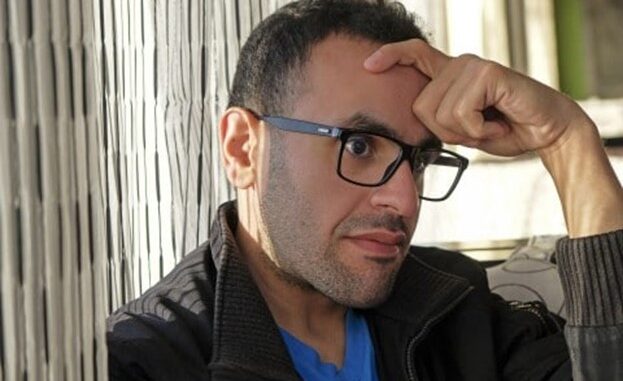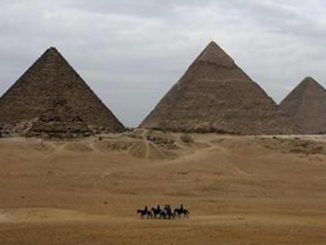
Egyptian security forces raided the homes of six relatives of an outspoken Egyptian American activist, arresting and imprisoning two cousins in defiance of calls by the Biden administration for the Egyptian government to improve its human rights record, rights advocates said Tuesday.
The targeting of the relatives of Mohamed Soltan, a human rights defender who lives in Northern Virginia, marks the latest attempt by the government of President Abdel Fatah al-Sisi to silence its critics living abroad, according to political opponents of the former military chief.Sunday’s arrests came about three months after five of Soltan’s relatives were released from prison, days after Joe Biden won the presidency. They had been forcibly taken from their homes in June after Soltan filed a lawsuit in the United States against former Egyptian prime minister Hazem el-Beblawi for his role in torturing Soltan when he was imprisoned in Egypt.
Biden highlighted the case during the presidential campaign, tweeting that torturing Egyptian activists and “threatening their families is unacceptable.” He also warned of “no more blank checks for Trump’s ‘favorite dictator,’ ” referring to Sisi by a term that President Donald Trump once used for him.
By going after Soltan’s relatives again, as well as the relatives of other foreign-based critics in recent days, the Sisi government appears to be challenging the Biden administration and its efforts to make human rights a foreign policy priority once again for the United States, activists and analysts said. It also underscores the uncomfortable relationship that is emerging between Sisi and the new White House.
“For Sisi, the big difference is that in Trump he had a president ready to do special favors for him,” said Michele Dunne, Middle East program director at the Carnegie Endowment for International Peace. “And he does not have that with Biden.”
Egypt’s State Information Service did not respond to a request for comment. Nor were there answers to questions sent to the Interior Ministry and state security organs through the Foreign Press Center, according to protocol.
Under Trump, Sisi was handed invitations to the White House that helped strengthen his grip inside Egypt, and his human rights misdeeds were mostly ignored publicly. The government’s abuses skyrocketed during the Trump era.
So far, the tone is significantly different under Biden. Secretary of State Antony Blinken has publicly denounced arrests of Egyptian human rights activists. Congressional Democrats last month created the Egypt Human Rights caucus, vowing to rebalance the U.S. relationship with Egypt with a focus on holding the Sisi government accountable for human rights abuses, corruption and mistreatment of American citizens.
Diplomatically, too, the Biden administration has indicated that the special relationship the United States has had with Egypt since the signing of a 1979 peace treaty with Israel could be less special in the years to come. For decades, Egypt has received billions in U.S. military aid, regardless of its human rights record or authoritarianism. But with a Democratic-controlled Congress, this aid could become subject to more conditions or reduced, Dunne said.
After Biden won office, Sisi congratulated him in a statement, saying he was looking forward to working with Biden and hoped to “boost the strategic bilateral relations” between Egypt and the United States. But as of Tuesday, the two leaders have yet to speak directly. Egypt also did not make the cut in the first 31 calls Blinken made to his counterparts overseas.
“It seems that Sisi and his regime are nervous about these changes and unsure how to handle them,” Dunne said. “Aside from investing in new lobbyists in Washington, Sisi seems to be tacking back and forth between appeasing and bullying tactics. For example, releasing Mohamed Soltan’s relatives back in November and now arresting them again.”
Mohamed Lotfy, executive director of the Egyptian Commission for Rights and Freedoms, said Trump normalized the idea in Egypt that human rights and democracy are no longer important. That, he added, “has emboldened people like Sisi, or other rulers elsewhere, to not care and not take seriously calls for democratic reforms.”
Sisi has demonstrated no willingness “to show a new face, or turn a new page,” Lotfy added. In early November, the courts ordered the release of about 400 prisoners, mostly jailed for anti-government protests. But none were actually released, and instead many were charged in new cases.
Also in November, security forces arrested three human rights activists working for the Egyptian Initiative for Personal Rights, a prominent rights group. They were released only after an international outcry from Blinken, Western governments and Hollywood celebrities.
“We saw an escalation, perhaps to test the waters, to see what the reactions would be” from the Biden administration, Lotfy said. “Or maybe it was a warning shot, to say, ‘We are still here.’”
A recent report citing anonymous Egyptian government officials in Mada Masr, a highly respected independent media outlet, suggests that a tug of war is unfolding inside the government on how to deal with the Biden administration. Egypt’s Foreign Ministry wants to ease up on human rights abuses to curry favor with Washington, but some figures in the powerful security and intelligence organs want to quash political opponents’ hopes that they can capitalize on Biden’s presidency, the report said.
Sunday’s arrests appear to be another escalation. About 2 a.m., plainclothes security forces raided the homes of Soltan’s relatives in the northern cities of Alexandria and Mounofiya, according to a statement Tuesday from the Freedom Initiative, a prisoners’ advocacy group that Soltan heads.
His cousins Moustafa and Khairi Soltan were immediately detained, while a third cousin, Ahmed Soltan, was questioned about his communications with Mohamed Soltan, the statement said. Ahmed Soltan, whose leg was in a cast from a previous injury, was ordered to turn himself in to authorities once his cast was removed. Moustafa and Ahmed Soltan were previously arrested in the June raid.
Other relatives were also questioned and were instructed to tell three other cousins that they were wanted by state security officials, the statement said.
Soltan, in a text message, said he thought his relatives were targeted again possibly because of his role in supporting the Egypt Human Rights Caucus. Pro-government and state-run media outlets have repeatedly attacked Soltan.
The government, he added, could be sending a “challenge signal to Biden on the back of my family.” It also could be “a way of creating a problem to solicit engagement” from the Biden administration, allowing the Sisi government to “resolve” the problem it had created, Soltan added.
State Department spokesman Ned Price said the Biden administration was looking into the reports of the detention of Soltan’s relatives.
“We have and continue to engage the Egyptian government on human rights concerns,” Price said. “We take seriously allegations of arbitrary arrest or detention. As we have said in other contexts, we will bring our values with us into every relationship that we have across the globe. That includes with our close security partners. That includes with Egypt.”
In recent days, the government has targeted other Egyptians abroad. At least three relatives of Aly Mahdy, an activist who was granted asylum in Chicago, were arrested after he called last month for Egyptians to celebrate the 10th anniversary of the Jan. 25, 2011, revolution that toppled autocrat Hosni Mubarak, the statement said.
Last week, Taqadum al-Khatib, an Egyptian academic based in Germany, said security forces had raided his family home and interrogated his parents about his pro-democracy activism.
“I believe the [Sisi] regime will be seen on the wrong side of history,” Khatib tweeted last week.
*By: Sudarsan Raghavan, The Washington Post’s Cairo bureau chief. The article was published by The Washington Post on 16 February 2021)



